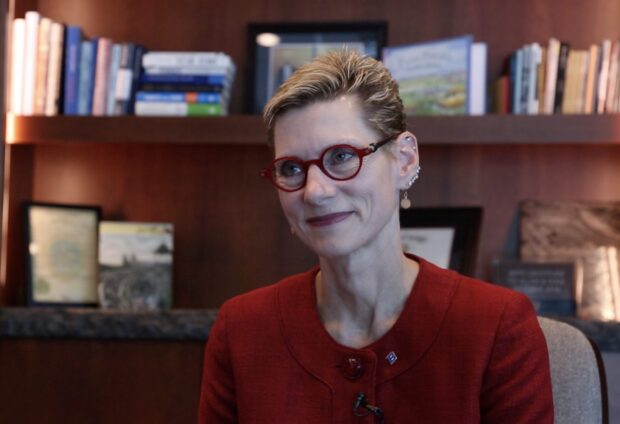The backlash over campus diversity and inclusion programs is partly a matter of misunderstanding, Boise State University President Marlene Tromp said Thursday.
Tromp says it’s incumbent upon the university to better explain what it does to support students from all backgrounds. But she also says the state’s universities need to attract and serve a more diverse student population — and that Boise State needs to provide a campus climate that helps all students succeed.

“I believe every student we serve helps every student on campus,” Tromp said in an Idaho Education News interview. “That student becomes a part of that thriving campus.”
A diversity and inclusion controversy flared in early July, less than two weeks after Tromp became president, when 28 House Republicans signed a letter saying the programs squander scarce state dollars and divide students. Tromp has spent the past few weeks meeting with legislators, individually and in groups, in Boise and in their hometowns. Before sitting down with Idaho Education News Thursday morning, Tromp had a meeting with House Republican leadership.
“What I’ve heard from a lot of people, as we’ve talked to folks, is they’re afraid that we’re pulling students away from each other somehow, and not giving students a chance to interact with each other,” she said.
Tromp chalks up the controversy, in part, to context and confusion.
When interim President Martin Schimpf outlined Boise State’s diversity programs in a June letter to the university, he focused on programs for Hispanic, American Indian and LGBTQ students. By design, the letter did not discuss programs Boise State provides for other student communities, Tromp said. Schimpf was also writing to the university community — including members of the community who want to see Boise State do more to support diversity efforts.
Schimpf’s letter, distributed less than a month before Tromp’s arrival, was a flashpoint in the diversity debate.
In recent weeks, Tromp also says she has spent time explaining the purpose of programs such as “Black Graduation” and “Rainbow Graduation.” The events give students a chance to celebrate with classmates from similar backgrounds, and are not separate from commencement ceremonies.
“All students are welcome at any of those celebrations,” Tromp said. “It was an opportunity for students to feel a sense of connection and to be a part of the whole.”
The recurring response from critics, Tromp said, has been a “sigh of relief.”
Despite the political ramifications, Tromp describes the discussions as constructive — and a chance to broach issues that might have festered under the surface.
“We’re in a fractious political moment,” she said. “I really want to see us engaged in dialogue about these important issues.”
Coming next week: An in-depth profile of Tromp, with more from Idaho Education News’ interview.
